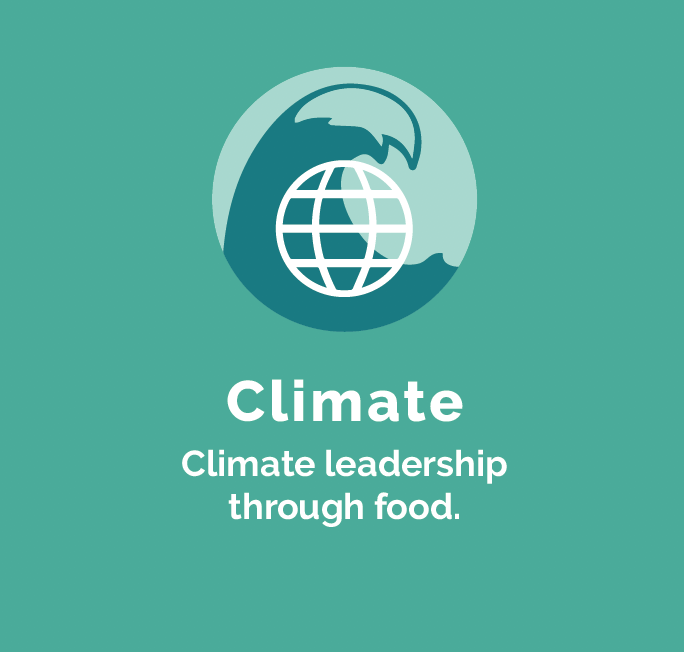Impact Areas
With rising health costs and growing health care needs on the horizon, Canadian health care systems are pressed to find ways to keep people healthy in their communities. Food is a key social determinant of health and a powerful intervention point in the fight against climate change.
Building on our key learnings and early impacts from the last three years, one thing is clear to us: Institutional leadership through food on climate, equity, and reconciliation is not a noble cause, it is a health imperative for the future. Nourish will support healthcare to leverage the power of food in three interconnected impact areas: 1) Climate; 2) Equity, and 3) Community Wellness. Nourish treats the impact areas of climate, equity and community wellness as interdependent.
Climate Leadership through Food
Why does Healthcare need to take leadership on this?
The Canadian health care sector generates 5.2% of the national carbon footprint. Carbon is embedded in global health care sector operations, transport and energy, however the lion’s share, 71% global health care footprint, stems from the production, transport, and disposal of goods and services such as pharmaceuticals and other chemicals, food and agricultural products, medical devices, hospital equipment, and instruments.
Rethinking food will be an important way to shrink health care’s carbon footprint. Reducing food waste and shifting to more plant-rich diets are amongst the top four strategies for reducing carbon emissions in the Drawdown research led by Paul Hawken. Indigenous foodways, including connection to land, respectful harvesting, and tracking ecosystem changes, are a source of wisdom to help navigate out of the climate crisis.
Climate change will also have a significant impact on population health, and threatens to widen disparities faced by marginalized communities around community health and well-being. Given the health care sector’s significant contribution to climate its leadership will be a vital part of our society, businesses and communities coming together to address the climate emergency.
Changing hospital menus, food service operations and procurement can help to decarbonize supply chains. Hospitals can use their significant purchasing power to ‘bring to life’ Canada’s food guide including serving less meat overall and sourcing more sustainable meat and plant-based protein. In this work it will be vital to support Indigenous communities access to traditional/country foods essential to their cultures.
Modeling of sustainable diets by health care facilities will contribute to population dietary shifts which can generate co-benefits from reduced risk of disease, health care costs and greenhouse gas emissions. US research found that “shifting half of the calories in the diet to plant-based foods, with these combined impacts on food and health, could be a 23% contribution towards the US meeting its Climate Action Plan goals.”
Address Upstream Determinants of Health through Food
Why does health care need to take leadership on this?
First Nation, Metis, and Inuit people in Canada are disproportionately food insecure, experience high rates of diet-related diseases like diabetes, and have poor access to clean water. Indigenous people have a life expectancy a full ten years shorter than non-Indigenous Canadians. The Truth and Reconciliation Commission calls the health sector to address the ongoing impacts of colonization and to close the health gap. Colonial paradigms on food safety that judge Indigenous foods “unsafe” are just one expression of the unconscious bias against Indigenous people. Reconnecting with Indigenous foodways and traditional knowledge is a way for Indigenous people to chart a path back to health. The TRC calls for cultural-competency training for all health care professionals, and calls providers “to recognize the value of Aboriginal healing practices and use them in the treatment of Aboriginal patients in collaboration with Aboriginal healers and Elders.”
Health inequity costs us all. There is a heavy burden on the health system from frequent users who are disproportionately lower socio-economic status. The widening disparities in income and wealth, exacerbated by climate change and social isolation, will continue to put more pressure on the healthcare system. Hospitals need to address the root causes of inequity as a fiscal imperative as well as a moral one.
Cultural competency is a priority in patient-centred care, and must be expressed through the food served to patients. When hospitals do not offer patients their preferred culturally relevant foods for healing, hospital staff often expect their patients’ family visitors to supplement food to improve patients’ appetite. However, individuals of lower socioeconomic status are already at a higher risk of food insecurity and may lack access to social networks that can support them while in hospital.
Resilient Communities through Food
Why does Healthcare need to take leadership on this?
Unhealthy eating and food insecurity are drivers of diet-related chronic disease with well-known impacts on our health care system: unhealthy eating costs $13.8 billion annually in Canada; and health care costs are 121% higher for those living with severely food insecurity. Recent research found that “among adults who died prematurely, those experiencing severe food insecurity died on average 9 years earlier than their food-secure counterparts”.
The Interrelated issues of diet, affordability and accessibility to healthy food are dealt with downstream by our health system which is oriented more to sickness care than preventative health upstream approaches. We have the power to leverage health care institution resources to invest in upstream approaches to improve nutrition, food environments, health care menus and access to fresh, healthy, cultural, local, sustainable food towards redesigning our food and health systems to be resilient and nourishing for people and the planet.
Health care institutions collaborating with their communities can address both the social and ecological determinants of health by reimagining food along the continuum of care out into the community and the broader food system. Sources of resiliency are community-connectedness and connection to nature. Social prescribing and food programs are powerful ways to build community.





